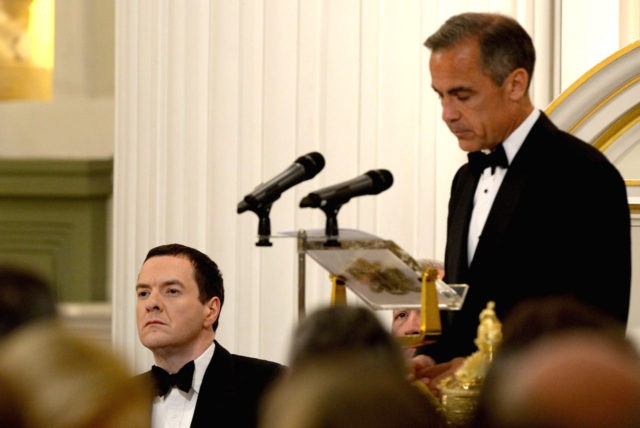The Bank of England Governor Mark Carney is facing calls to be fired after the bank warned that leaving the European Union could plunge Britain into a recession, causing house prices to crash and wages to fall.
Dismissing the warnings as yet another episode of the establishment’s Project Fear, critics have accused Mr Carney of being a stooge for Chancellor George Osborne. Senior Conservative figure Iain Duncan-Smith, who recently quit the cabinet over Osborne’s plans to slash benefits, went on to call the Treasury the “worst thing in Britain.”
In a doom-laden announcement, Mr Carney warned that leaving the EU could have “material economic effects,” causing households and businesses alike “defer consumption” and “delay investment,” while global demand could also reduce, negatively affecting British exports.
Foreign market activity suggests sterling could also fall, “perhaps sharply” he said, boosting inflation.
Meanwhile house prices could fall and the cost of mortgages rise, he suggested.
Mr Osborne welcomed the intervention, calling it “a very big moment in the debate about the economic costs of leaving the EU.”
He said the said the UK now had a “clear and unequivocal warning” about the risks of leaving the EU, adding: “either families would face lower incomes because inflation would be higher, or the economy would be weaker with a hit to jobs and livelihoods. This is a lose-lose situation for Britain. Either way, we’d be poorer.”
But it has not been received well by independent analysts, who spied Mr Osborne’s fingerprints on the speech.
David Buik, an analyst at stockbroker Panmure Gordon, said: “I must confess to being very surprised at the rapaciousness of the warning. It was blunt and to the point. It was as if George Osborne had written the script.”
The intervention has also provoked anger from leading Leave campaigners, including Mr Duncan-Smith, who last month quit the cabinet following rows with the Treasury over planned benefits cuts.
“The worst thing we have in Britain is the Treasury,” he fumed, adding that the Treasury dominates Government thinking but is characterised by “lack of vision” and a “short-term” obsession with cuts.
He gave a “sigh of relief” when he left government as he would “never have to deal with those people again,” he revealed, and took a dig at Treasury staff, saying: “The average age in the Treasury is 27. They spend no more than two years in any single part of the Treasury. They have no collective memory for any agreement or decision that had been taken before they arrived at their desks.”
Turning his attention to Mr Carney’s comments, he said: “I’d be very careful about [Mr Carney] entering the fray on this one, because, whatever else forecasts are almost always wrong.”
The Bank of England had predicted that unemployment would fall slowly, he said, – it fell far faster; it predicted that interest rates would have to be raised – they weren’t; and he said the economy hasn’t performed as expected either.
“If anybody can tell me they know what the global economy is going to be doing over the next year, let alone the next ten years, I’d say either they’re soothsayers or they have some link with God.
“All forecasts are wrong. You should take them all with a pinch of salt.”
Tory backbencher Jacob Rees-Mogg went further, telling LBC that the Governor has “behaved quite improperly”, and that “he should be fired.
“He’s become a political partisan in this debate, and this undermines the Bank of England’s independence,” he added.
“I think it is unprecedented … suggesting sterling will fall sharply is simply not what responsible central bankers do.”
His comments were echoed by former Chancellor Lord Lamont, who warned that imprudent statements carried the possibility of becoming self-fulfilling prophesies: “The governor should be careful that he doesn’t cause a crisis,” he said.
“If his unwise words become self-fulfilling, the responsibility will be the governor’s and the governor’s alone. A prudent governor would simply have said that ‘we are prepared for all eventualities’.”
A spokesman for Mr Carney said: “The Bank of England has not made, and will not make, any overall assessment of the economics of UK’s membership of the European Union.
“At the same time, the Bank must assess the implications of the UK’s EU membership for our ability to achieve our core objectives and we have a duty to report our evidence-based judgments to Parliament and to the public. That is the fundamental standard of an open and transparent central bank.

COMMENTS
Please let us know if you're having issues with commenting.